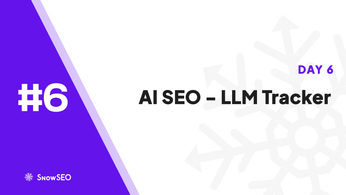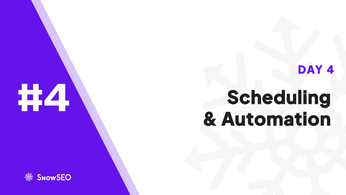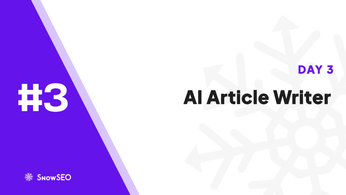
How to Automate SEO Workflows Efficiently
Table of Contents
Unlock the potential of SEO automation and save time on repetitive tasks. Many SEO professionals struggle to efficiently manage workflows without automation, often leading to wasted resources. Learn to automate your SEO processes with advanced tools and strategies. Drawing from industry experts and case studies, this guide offers proven tactics for boosting productivity and accuracy, as highlighted by Wikipedia’s overview of search engine optimization and recent academic research.
Automating SEO workflows involves leveraging technology to streamline and enhance various search engine optimization tasks. This approach integrates tools and software to manage processes such as keyword research, content optimization, link building, and performance analysis, reducing manual effort and increasing efficiency.
Key Benefits of Automation
- Efficiency: Automated tools can perform repetitive tasks like data collection and analysis more quickly than humans, allowing SEO professionals to focus on strategic planning.
- Consistency: Automation ensures that SEO tasks are executed uniformly, reducing the likelihood of errors and maintaining quality across campaigns.
- Scalability: With automation, managing multiple projects or large-scale websites becomes more feasible, as tools can handle vast amounts of data simultaneously.
- Data-Driven Insights: Automated systems can analyze large datasets to identify trends and provide actionable insights, leading to more informed decision-making.
Implementing automation in SEO workflows not only enhances productivity but also contributes to more effective and data-driven optimization strategies.

Tools to Automate SEO Workflows
In the dynamic realm of digital marketing, automating SEO workflows has become essential for enhancing efficiency and maintaining a competitive edge. Leveraging specialized tools can streamline tasks such as keyword research, on-page optimization, and performance tracking.
Top Tools for SEO Automation
Several tools have emerged as leaders in automating various aspects of SEO:
- Ahrefs: Renowned for its comprehensive backlink analysis and keyword research capabilities, Ahrefs enables users to monitor competitors and identify content opportunities effectively.
- SEMrush: This all-in-one platform offers features like site audits, keyword tracking, and competitive analysis, facilitating informed decision-making in SEO strategies.
- Moz Pro: Moz Pro provides tools for site audits, rank tracking, and link analysis, assisting in optimizing website performance and search engine visibility.
- Screaming Frog SEO Spider: A desktop program that crawls websites to analyze on-page SEO elements, Screaming Frog helps identify issues such as broken links and duplicate content.
- Google Search Console: A free tool from Google, it offers insights into website performance, indexing status, and potential issues affecting search visibility.
Integrating these tools into your SEO workflow can significantly enhance productivity and effectiveness.
Implementing Automated SEO Workflows
Automating SEO workflows can significantly enhance efficiency, accuracy, and scalability in digital marketing efforts. By leveraging automation tools, businesses can streamline repetitive tasks, allowing SEO professionals to focus on strategic initiatives.
Setting Up Your First Automated Workflow
Embarking on SEO automation begins with identifying tasks that are time-consuming and repetitive, such as keyword research, content optimization, and performance monitoring. Selecting the right tools is crucial; platforms like Ahrefs, SEMrush, and Moz Pro offer comprehensive features for automating various SEO processes.
Steps to Implement Your First Automated SEO Workflow:
- Define Objectives: Clearly outline what you aim to achieve with automation, such as improving keyword rankings or enhancing backlink profiles.
- Choose Appropriate Tools: Evaluate and select tools that align with your objectives and integrate seamlessly with your existing systems.
- Configure Automation Settings: Set up the tools to perform specific tasks automatically, like scheduling regular site audits or generating keyword reports.
- Monitor and Adjust: Regularly review the outcomes of automated tasks to ensure they meet your goals, making adjustments as necessary.
Implementing automated workflows not only saves time but also reduces the likelihood of human error, leading to more consistent and reliable SEO performance.

By thoughtfully integrating automation into your SEO strategy, you can achieve more efficient and effective outcomes, allowing your team to concentrate on creative and strategic tasks that drive growth.
Future Trends in SEO Automation
The landscape of Search Engine Optimization (SEO) is undergoing a significant transformation, driven by advancements in artificial intelligence (AI) and machine learning. These technologies are reshaping how search engines interpret content and user intent, leading to more sophisticated and automated SEO strategies.
The Next Generation of Automation Tools
Emerging AI-powered tools are revolutionizing SEO by automating complex tasks such as content creation, keyword analysis, and performance monitoring. For instance, AI algorithms can now generate high-quality, contextually relevant content that aligns with user intent, enhancing both engagement and search rankings. Additionally, machine learning models are being employed to predict search engine algorithm changes, allowing for proactive strategy adjustments. These advancements enable SEO professionals to focus on strategic planning while routine tasks are efficiently managed by AI systems.
As AI continues to evolve, the integration of natural language processing and deep learning into SEO tools is expected to further enhance their capabilities, making them indispensable in the digital marketing landscape.
Ready to automate your SEO workflows and boost efficiency? Discover how SnowSEO streamlines every step, from research to publishing. Explore and adopt the mentioned automation tools today at https://snowseo.com for smarter, faster SEO results.
Frequently Asked Questions
Q1: What are the main benefits of automating SEO workflows?
Automating SEO workflows saves significant time, reduces human error, and ensures consistency in repetitive tasks. It allows teams to focus on strategy and creative work by handling data collection, reporting, and technical audits automatically. This leads to faster implementation, improved scalability, and more actionable insights, ultimately helping businesses achieve better search rankings and ROI.
Q2: Which SEO tasks are best suited for automation?
Tasks such as keyword tracking, site audits, backlink monitoring, and reporting are ideal for automation. These processes involve large datasets and routine checks that can be efficiently managed by automation tools, freeing up resources for higher-level analysis and decision-making.
Q3: Can automation replace human expertise in SEO?
Automation enhances efficiency but cannot fully replace human expertise. Strategic planning, content creation, and interpreting nuanced search trends still require human judgment and creativity. Automation is most effective when combined with skilled SEO professionals.
Conclusion
Automating SEO workflows enhances efficiency by streamlining repetitive tasks, allowing professionals to focus on strategic initiatives. This approach not only improves productivity but also ensures consistency and accuracy in SEO practices. To future-proof SEO strategies, it’s essential to integrate automation tools that adapt to evolving search engine algorithms and user behaviors. Embracing these technologies positions organizations to maintain a competitive edge in the dynamic digital landscape.





